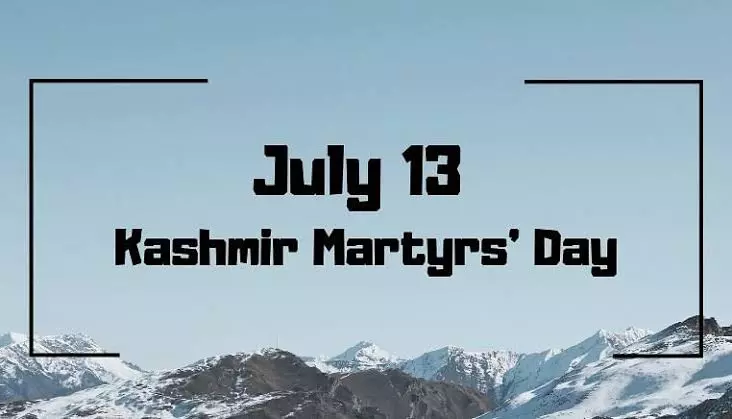Srinagar to Witness Partial Curbs on Kashmir Martyrs Day

Srinagar: The Jammu and Kashmir authorities have decided not to allow public gatherings beside Srinagar's Mazaar-e-Shohada or martyrs’ cemetery on the Kashmir Martyrs' Day on Saturday.
The Khawaja Bazaar locality in the Khanyar quarter of central Srinagar where the ‘martyrs’ of July 13, 1931 are buried will be sealed by the police around midnight Friday or early Saturday to restrict the public movement.
Kashmir’s chief Muslim cleric and chairman of his faction of separatist Hurriyat Conference Mirwaiz Umar Farooq and some other Kashmiri separatist and mainstream politicians who may want to visit the precincts to pay homage to the martyrs are likely to face restriction of their movements, the sources told this newspaper. “The security situation will be reviewed, and a decision taken by the authorities at a meeting later today. Any restrictions on their movement will be a precautionary measure,” a police official said privately.
In the recent past, the J&K authorities have debarred the local political leadership from visiting Srinagar’s old Mazaar-e-Shohada on the Kashmir martyrs’ day. On the occasion, police reinforcements are fanned out in City’s Khanyar quarter on the July 13 morning to impose partial curbs in the densely populated area to prevent public assemblies at the cemetery.
The Kashmir martyrs’ day would be observed by various political parties and at the official level too in the past. But since 2018, the J&K government has completely disregarded a historical event that had led to local Muslims’ uprising against autocratic Dogra Maharaja’s rule but is interpreted differently by the BJP, the Kashmiri Pandit outfits and some other like-minded political groups.
On July 13, 1931, as many as 22 Kashmiri Muslims were killed in firing by the Maharaja's army outside Srinagar’s central prison where an in-camera trial of Abdul Qadeer Khan, a non-local chef with a British traveller, was being held.
Khan had been charged with sedition and instigating people for violence after he made fiery speeches against the Maharaja’s “oppressive” rule at a Friday congregation in Srinagar’s Khankah-e-Maulla hospice and while pointing towards his Palace asked people to raze it “brick by brick.” July 13 is observed as ‘Martyrs’ Day’ on both sides of the Line of Control (LoC) since.
Traditionally, the head of the government in J&K or its representatives would visit Mazaar-e-Shohada to pay obeisance to the martyrs of July 13, 1931 and lay wreaths at their graves. A special contingent of J&K policemen would post the bugle and present the ceremonial guard of honour to the martyrs. Processions would be taken out through the streets of Srinagar which would culminate into public rallies to be addressed by politicians at the Mazaar-e-Shohada.
However, no such customary ceremony has taken place at the cemetery since 2020 nor is any resident being allowed to enter the premises on the occasion. On each such day since, both entrances to the mazaar were locked by the authorities and gun-wielding policemen stood guard outside it the whole day. However, Kashmiri political parties and their leaders have criticized it and said that such attempts “cannot erase the history and the watershed moment that are etched on the minds of people”.
The J&K Government had in January 2020, six months after the erstwhile state was stripped of its special status and split up into two Union Territories, cancelled the gazetted state holiday on July 13. The decision, however, evoked widespread condemnation by local political parties and vast sections of J&K Muslims termed it as an “onslaught” on their ethos and a “deliberate attempt” to “hurt” their sentiments.
A year later, the Lieutenant Governor-led administration, conceding the demand of various political and ethnic groups of Jammu and the BJP, declared September 23-the birthday of Maharaja Hari Singh- a public holiday. It was during his rule that the shooting incident outside Srinagar’s central prison had taken place.
Panun Kashmir, Kashmir Vahini and some other political groups of displaced Kashmiri Pandits observe a ‘back day’ on the occasion as they believe that July 13, 1931 also marked the beginning of “persecution” of the minority Hindus in the Valley by Muslim majority. The BJP and like-minded parties having strong base in Jammu, the native place of despotic Dogra Maharajas, consider their rule in undivided J&K as a ‘golden period’ and also maintain that Maharaja Hari Singh was a genuine ruler of the State and the rebellion against him was “illegitimate”. When ruling J&K with PDP between 2015 and 2018, the BJP ministers in the coalition government would skip the official wreath laying ceremony at Mazaar-e-Shohada and publicly say “they are not our martyrs”.
Mirwaiz Umar in his post-Friday namaz sermon at Srinagar’s Jama Masjid said that those slain 93 years ago “stood up to the despot of the time and laid down their lives in the path of justice and to assert the rights and protect the dignity of the people of J&K”. He added, “Their valour will always be remembered and recalled”.
The Hurriyat Conference called July 13, 1931 “a turning point” in the contemporary history of Kashmir “as the killing of 22 people in cold blood by the Dogra forces led to the launch of the political agitation by the people of J&K for their unshackling and empowerment and the realisation of their political aspirations, continuing till date.”

